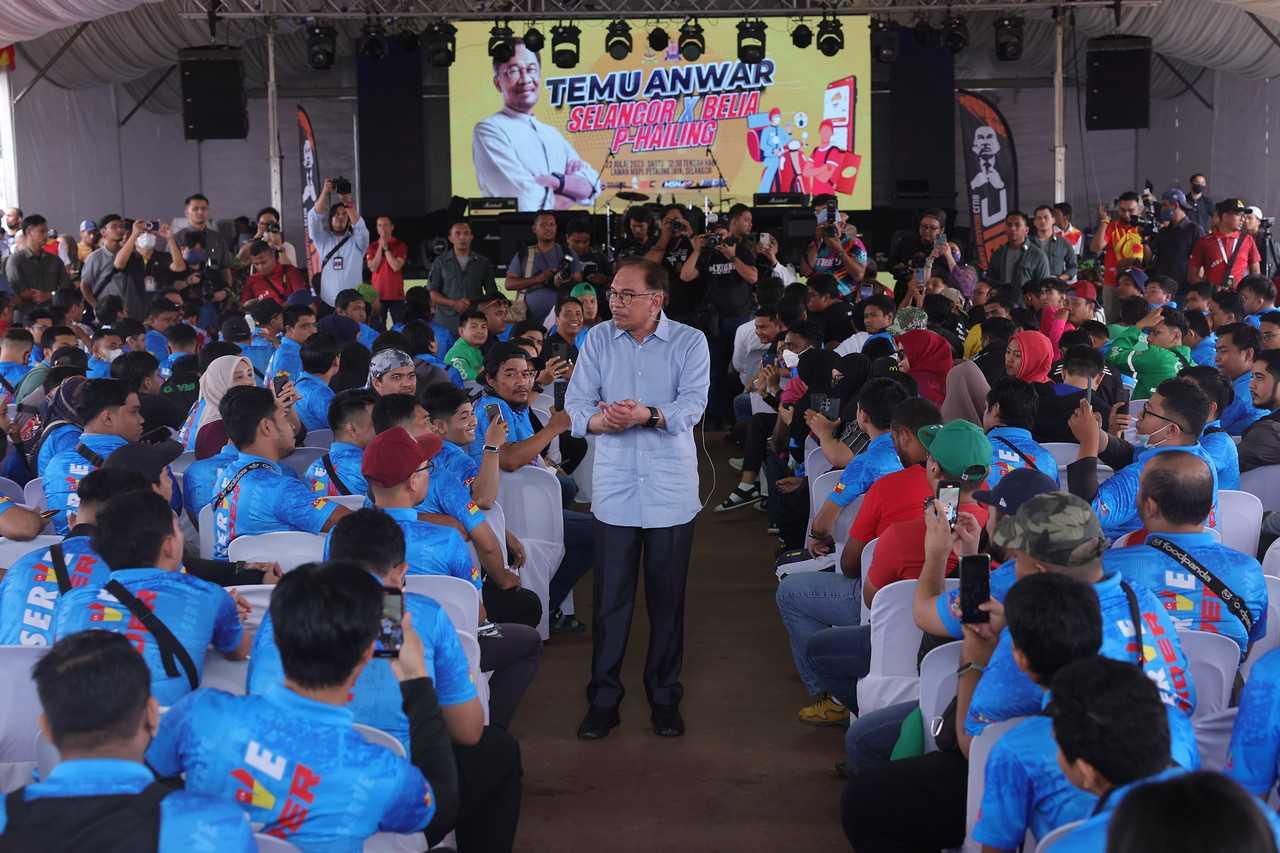'Mat Motor', Malaysia's unique voting bloc?
As elections loom in six states, the vote of food delivery riders could be a defining factor.
Just In
After Barisan Nasional was ousted from power following over six decades of rule in the 14th general election, which saw the downfall of Najib Razak, the former leader would appear in public as a "motorbike enthusiast", dressed in black from head to toe, complete with a parka jacket, jeans, shoes, and a black motorbike.
He would frequently hold meetings with motorbike groups around the Klang Valley, sparking the "Bossku" phenomenon when a clip of him with a youth saying the tagline went viral.
Though Najib was never seen riding a motorcycle, he was recorded mimicking motorbike riders by twisting the throttle and stepping on the brakes, a fun action common among motorcycle-riding groups.
Najib's appearance and attire at events with motorbike lovers were met with enthusiastic cheers from the audience.
Several years later, Najib was sentenced to 12 years in jail after being convicted in the multibillion-dollar 1MDB embezzlement scandal, but the motorcycle-riding groups continue to hold a place in the country's political arena.
The group comes across as a unique entity as it is considered a distinct voting segment.
According to political observer Akwa Mahzan, motorcycle riders can be classified into two main groups based on their economic background.
The first is an elite group of high-powered motorcycle riders, while the second consists of riders with affordable motorcycles who do not come from wealthy socioeconomic backgrounds.
Akwa, a former researcher at the Initiative to Promote Tolerance and Prevent Violence, said the latter was what society often referred to as "mat rempit", or motorbike thugs.
"This motorcycle-riding segment has had political support for a long time. They represent a segment of young voters, typically aged 21 to their late 20s or 30s. Because of their large numbers, they are easily influenced by politicians. Through their activities, politicians can offer incentives to secure their votes," he told MalaysiaNow.
Akwa said that apart from Najib, former Umno leader Khairy Jamaluddin had also mingled with motorbike-riding groups in Negeri Sembilan, even setting up a special motorbike track for their use.
Election season in Malaysia sees active participation from motorcycle-riding groups who show up in large numbers, carrying party flags for campaigning, parading during candidate nominations, and escorting key leaders to rally stages.
Due to their weaker economic status, however, their involvement in politics is often labelled as a form of inducement by politicians who pay them to attend specific events.
Akwa said while this perception was not entirely wrong, motorbike riders actually served as mobilisation agents for political parties, especially in carrying party flags, making them a part of the party machinery.
"But not all of them are party members," he added.
Meanwhile, political analyst Mazlan Ali of Universiti Teknologi Malaysia said motorbike-riding groups had the potential to promote certain ideas due to their attention-grabbing activities, such as performing and recording stunts on roads, which would then go viral on social media platforms.
Prime Minister Anwar Ibrahim recently met with food delivery or p-hailing riders to discuss welfare issues involving workers in that sector ahead of the elections in six states to be held on Aug 12.
At the event in Shah Alam, Selangor, Anwar also announced an allocation of RM1 million for a committee to streamline the management and supervision of p-hailing riders.
His announcement came months after Pakatan Harapan secretary-general Saifuddin Nasution courted controversy for saying that the youth who voted for Perikatan Nasional at last year's general election lacked higher education and a steady income.
Saifuddin's statement in February sparked various reactions, including from the youth, some of whom who said the coalition doubted their support for PH.
Akwa said PH could not ignore this group and should instead engage with them.
"They want a chance. So, whichever party taps into an underground community like the motorcycle riders will get their support. If a political party can connect with this community, they can bridge the socio-economic gap between the people," he said.
Mazlan, meanwhile, described Anwar's move to engage with p-hailing riders as a wise decision, adding that they had the potential to make a significant impact.
He said that p-hailing riders, as a large group of motorcycle enthusiasts, could help promote leaders and politicians.
"This group serves the people, so naturally, there is greater sympathy and support for them," he added.
Subscribe to our newsletter
To be updated with all the latest news and analyses daily.
